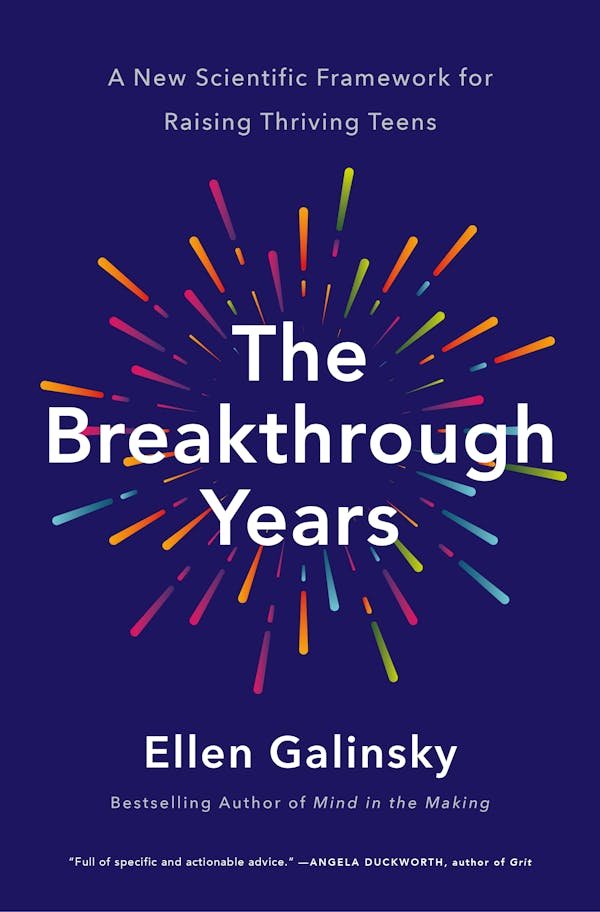Listen is my word of the year.
Tonight I had the privilege of hearing Ellen Galinsky share the results of her 9+ years of listening to adolescents as she shared thoughts from her new book: The Breakthrough Years: A New Scientific Framework for Raising Thriving Teens.
I haven’t yet read the book (it just came out!), but the five messages Ellen shared in her talk at Bank Street College of Education resonated deeply as I think about my leadership, parenting, and coaching clients. It’s late - so these are quick notes. All errors are mine!
Kids said:
1: Grown-ups don’t understand us.
Majority of words used to describe teenagers and/or teenage brains are negative.
2: We want you to listen and talk to us not at us.
Kids said they deserve to be treated as if “we are capable.”
Research shows conflict with teenagers doesn’t happen as often as we think it does.
“It’s not all social media, folks.”
Engage with what Stephanie Carlson calls autonomy supportive actions (halfway between taking over and doing nothing.) and kids learn, are less stressed, and less depressed. “It’s not all social media, folks.”
When interviewing parents about a time when they “lost it” with their kids (which she defines as being “not the person you wanted to be”), Ellen found parents generally took one of two attitudes.
Some saw their kid as a threat (Galinsky compared this to psychologist Carol Dweck’s fixed mindset…though she is calling it an “adversity mindset”)
Others saw their kid as a challenge (growth mindset, or “possibility mindset”)
Not surprisingly, all of us have both mindsets, and we just choose which to dial up or down. Research (sorry, didn’t note citation) of shows taking a possibility mindset led to less conflict and more listening. She emphasized the importance of supporting autonomy development.
3. Don’t stereotype or label us.
Many (most) stereotypes about teenagers are negative. (Sorry, no citation here either.) The kids Ellen interviewed asked: “Why do people not like teenagers?”
She cited some fascinating research from Larry Steinberg about risks… reframing risk-taking as sensation seeking. Yes, some risks are dangerous…but taking positive risks is what “helps propel us into the world.” Indeed, it is part of growing and learning. Examples of positive risks: cooking dinner, trying something new, standing up and performing, sitting with someone you don’t know. Yet, some 2019 study showed thousands of studies about negative risks, but only three on positive ones. Ellen argues researchers need to see adolescents differently, and that schools and grownups have countless opportunities to build in more positive risk-taking.
She also talked about how teaching kids about their own stress (showing stress can have positive components too) led to better outcomes. In her conclusion, Ellen said two of the things that surprised her most during her research were (1) the strength of the negative stereotypes about teenagers and (2) the power of positive risks.
4. We are trying to figure out who we are and how we can make a difference. Give us a chance to do so.
“I hope you go to schools where adults understand that all of us have basic psychological needs. And meeting them is not a nice to do, but a must do. ”
Teenagers (like all humans) have not only basic physical needs (food, water, shelter), but basic psychological needs. In the kids’ words, these five needs (which are part of something called self-determination theory) are being met when they feel:
They belong (social connection)
Treated with respect
Competent (and treated as though they are)
Safe to figure out who they are (some autonomy)
Can contribute (sense of purpose)
When these basic needs aren’t met, it’s a problem. (Maybe easier to blame social media than to notice how teenagers are being treated?) Teenagers want to be in environments where they can develop in a healthy way. Feeling a sense of belonging does not mean “coddling,” but creates an environment for thriving, where children (or adults) can grow together and help each other. She mentioned something about a thriving workplace index, and I want to learn more about that.
5. We are drawn to learn life and learning skills.
Kids want to learn, and Ellen was impressed by the power of children’s words, both “how articulate they are about their own development and how much they want to know about it.” She focused her remarks here on the essential nature of learning executive function. Studies (here is one, but she mentioned many) indicate that while learning often focuses on content, executive function (EF) skills are the most predictive of achievement, health, wealth and quality of life. There are lots of definitions of EF, but I liked Ellen’s quick summary.
She said EF are “attention regulation” skills - basically, how you focus and pay attention. Under this umbrella, there are four main skills:
Using what you know (working memory)
Thinking flexibly (world changes)
Reflecting (step back – the pause before you act)
Self-control (doing what you need to do to achieve a goal)
Given its importance and impact, she emphasized that nearly every interaction can be an opportunity to teach EF (and she was amazed at the number of missed opportunities). For example, effective digital literacy education is an opportunity to teach self-control. Moreover, Ellen discussed helping kids to become content creators, not consumers.
Ellen closed her presentation by thanking her mom. She said it wasn’t until she started visiting friends’ houses as an older child that she realized that her mom tried to always listen to her and her sister. “I didn’t realize how unusual that was and how lucky I was to learn that so young.”
PS: Ellen shared some beautiful reflections titled “Listening is Where the Love Begins” in her blog, referencing her work with Fred Rogers.
More inspiration for 2024!







